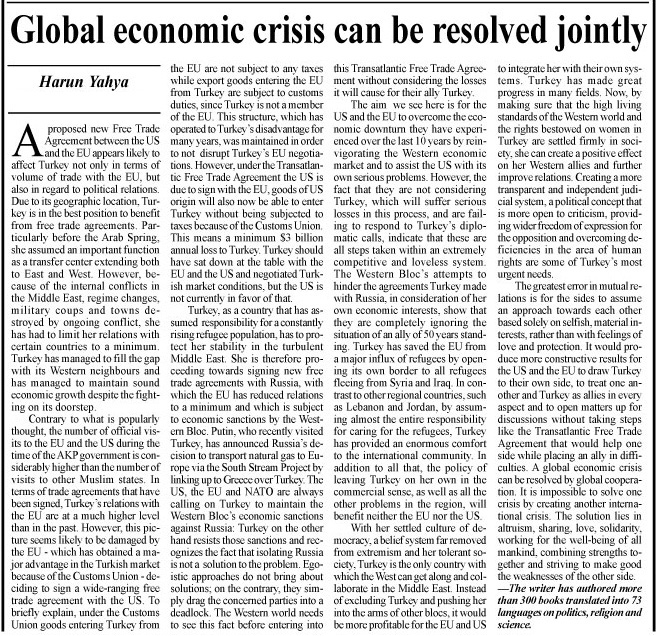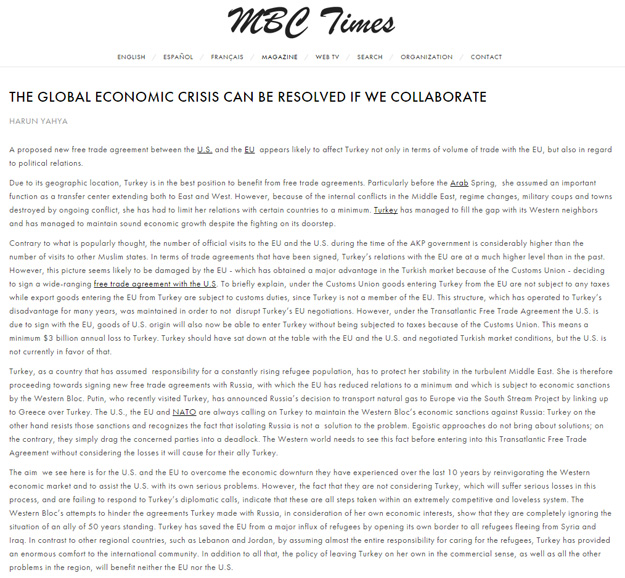
A proposed new free trade agreement between the U.S. and the EU appears likely to affect Turkey not only in terms of volume of trade with the EU, but also in regard to political relations.
Due to its geographic location, Turkey is in the best position to benefit from free trade agreements. Particularly before the Arab Spring, she assumed an important function as a transfer center extending both to East and West. However, because of the internal conflicts in the Middle East, regime changes, military coups and towns destroyed by ongoing conflict, she has had to limit her relations with certain countries to a minimum. Turkey has managed to fill the gap with its Western neighbors and has managed to maintain sound economic growth despite the fighting on its doorstep.
Contrary to what is popularly thought, the number of official visits to the EU and the U.S. during the time of the AKP government is considerably higher than the number of visits to other Muslim states. In terms of trade agreements that have been signed, Turkey’s relations with the EU are at a much higher level than in the past. However, this picture seems likely to be damaged by the EU - which has obtained a major advantage in the Turkish market because of the Customs Union - deciding to sign a wide-ranging free trade agreement with the U.S. To briefly explain, under the Customs Union goods entering Turkey from the EU are not subject to any taxes while export goods entering the EU from Turkey are subject to customs duties, since Turkey is not a member of the EU. This structure, which has operated to Turkey’s disadvantage for many years, was maintained in order to not disrupt Turkey’s EU negotiations. However, under the Transatlantic Free Trade Agreement the U.S. is due to sign with the EU, goods of U.S. origin will also now be able to enter Turkey without being subjected to taxes because of the Customs Union. This means a minimum $3 billion annual loss to Turkey. Turkey should have sat down at the table with the EU and the U.S. and negotiated Turkish market conditions, but the U.S. is not currently in favor of that.
Turkey, as a country that has assumed responsibility for a constantly rising refugee population, has to protect her stability in the turbulent Middle East. She is therefore proceeding towards signing new free trade agreements with Russia, with which the EU has reduced relations to a minimum and which is subject to economic sanctions by the Western Bloc. Putin, who recently visited Turkey, has announced Russia’s decision to transport natural gas to Europe via the South Stream Project by linking up to Greece over Turkey. The U.S., the EU and NATO are always calling on Turkey to maintain the Western Bloc’s economic sanctions against Russia: Turkey on the other hand resists those sanctions and recognizes the fact that isolating Russia is not a solution to the problem. Egoistic approaches do not bring about solutions; on the contrary, they simply drag the concerned parties into a deadlock. The Western world needs to see this fact before entering into this Transatlantic Free Trade Agreement without considering the losses it will cause for their ally Turkey.
The aim we see here is for the U.S. and the EU to overcome the economic downturn they have experienced over the last 10 years by reinvigorating the Western economic market and to assist the U.S. with its own serious problems. However, the fact that they are not considering Turkey, which will suffer serious losses in this process, and are failing to respond to Turkey’s diplomatic calls, indicate that these are all steps taken within an extremely competitive and loveless system. The Western Bloc’s attempts to hinder the agreements Turkey made with Russia, in consideration of her own economic interests, show that they are completely ignoring the situation of an ally of 50 years standing. Turkey has saved the EU from a major influx of refugees by opening its own border to all refugees fleeing from Syria and Iraq. In contrast to other regional countries, such as Lebanon and Jordan, by assuming almost the entire responsibility for caring for the refugees, Turkey has provided an enormous comfort to the international community. In addition to all that, the policy of leaving Turkey on her own in the commercial sense, as well as all the other problems in the region, will benefit neither the EU nor the U.S.
With her settled culture of democracy, a belief system far removed from extremism and her tolerant society, Turkey is the only country with which the West can get along and collaborate in the Middle East. Instead of excluding Turkey and pushing her into the arms of other blocs, it would be more profitable for the EU and U.S. to integrate her with their own systems.
Turkey has made great progress in many fields. Now, by making sure that the high living standards of the Western world and the rights bestowed on women in Turkey are settled firmly in society, she can create a positive effect on her Western allies and further improve relations. Creating a more transparent and independent judicial system, a political concept that is more open to criticism, providing wider freedom of expression for the opposition and overcoming deficiencies in the area of human rights are some of Turkey’s most urgent needs.
The greatest error in mutual relations is for the sides to assume an approach towards each other based solely on selfish, material interests, rather than with feelings of love and protection. It would produce more constructive results for the U.S. and the EU to draw Turkey to their own side, to treat one another and Turkey as allies in every aspect and to open matters up for discussions without taking steps like the Transatlantic Free Trade Agreement that would help one side while placing an ally in difficulties. A global economic crisis can be resolved by global cooperation. It is impossible to solve one crisis by creating another international crisis. The solution lies in altruism, sharing, love, solidarity, working for the well-being of all mankind, combining strengths together and striving to make good the weaknesses of the other side.
Adnan Oktar's piece on MBC Times & Pakistan Observer:
http://epaper.pakobserver.net/201502/21/comments-1.php
http://www.mbctimes.com/english/the-global-economic-crisis-can-be-resolved-if-we-collaborate



